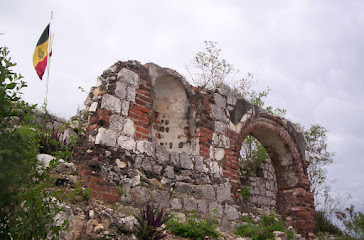Friday 7th October, 1814. The Glasgow Herald newspaper in Scotland, United Kingdom - publishes an article challenging false French/European media propaganda about the state of the Kingdom of Haiti, under the rule of King Henri Christophe.
Eleven years have nearly elapsed since Christophe assumed the sovereignty of Hayti and all that interval appears to have been anxiously devoted to the glorious work of rendering it a free, happy, powerful, and independent State. His Court is upon the plan of that of the late Emperor of the French, and displays all its pomp and parade. The Chiefs of his army, which is in the best state, have also their titles and military orders; but, from recent intelligence, it appears that the increase of his military strength has not interfered with the cultivation of the country. On the 23d of February, a body of rebels, amounting to between 1200 and 1500, were attacked in Fort Sabourin, by the imperial troops, who carried the place by assault, and either killed or captured most of the garrison. A larger body of rebels occupied Port aux Crimes, to which Fort Sabourin was a sort of out-post, and these have been greatly weakened and intimidated by its fate.
With this exception, the empire of Hayti appears perfectly tranquil and happy, full of loyalty to its sovereign, and enthusiastically attached to its new constitution, its laws, and its independence. The letters received from that part of Hayti which is under the dominion of King Henry (Christophe) fully corroborate the representation which we made a few days ago, of the present state of that country. A most mistaken idea has prevailed in France, that the island was wholly desolate and uncultivated, and the population daily diminishing, more even from want of sustenance than by the effect of the wars, which were supposed to have been, for several years past, alike sanguinary and incessant. The present advices contain the best refutation of these follies, by stating the number of ships which, under various flags, have sailed from the Haytian ports for Jamaica, St. Thomas’, St. Bartholomew’s, and the United States, laden with sugar and coffee. The flourishing state of the culture which could allow of such an exportable produce must have been very favourable to population; and the ease and safety with which extensive mercantile transactions are carried on there imply no small share of solidity in the negro government, and no little degree of civilization in its institutions. It is no wonder that the real state of Hayti should be so little known in Europe, and particularly in France, where such pains was taken to disguise from the people the calamities of the last expedition, and the atrocious perfidy by which Bonaparte produced those calamities. Even in England no great curiosity has been felt to trace the growth and progress of the negro empire. It was at first viewed with alarm, as dangerous to the existence of our own colonies-but now hat it has been seen to exist several years, without occasioning them the least inconveniences, we have in general ceased to concern ourselves with the Haytians. Nevertheless, it is at least a singularity in history, that a Christian kingdom, similar in all tis institutions to the most civilized European communities, should subsist in the western hemisphere, composed entirely of negroes and their descendents. The sovereign, the nobles, the church, the law, the army, have their respective functions and privileges as distinctly marked out as in Europe. The theory, at least, of government, or, as the French call it, the political organization, is complete. What defects there may be in practice, we cannot pretend to say; but we doubt much whether there be not some parts of the negro administration which may well put to shame prouder societies. We enter not into the question, how far the present government of France may legally claim a right of dominion over Hayti, or to attempt to enforce it by war; whether that right be more or less chimerical than that of our own sovereign over the United States of North America; or the titles of the St. Domingo planters to their former estates, more or less valid than those of the emigrants to the national domains in France. Malenfaut, after accusing the English government of having instigated Bonaparte’s expedition, insinuates, that it has engaged the Bourbon princes to sacrifice 100,000 French lives on a similar attempt, in the intention of renewing the war against France, when her troops shall be absent in St. Domingo.
Wild, absurd, and extravagant as this calumny is, we almost hesitate to think, that it will not find believers in France, especially if the proposed expedition should meet with the fatal termination, which is reasonably to be expected.









.jpg)
.jpg)







